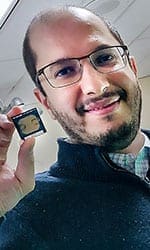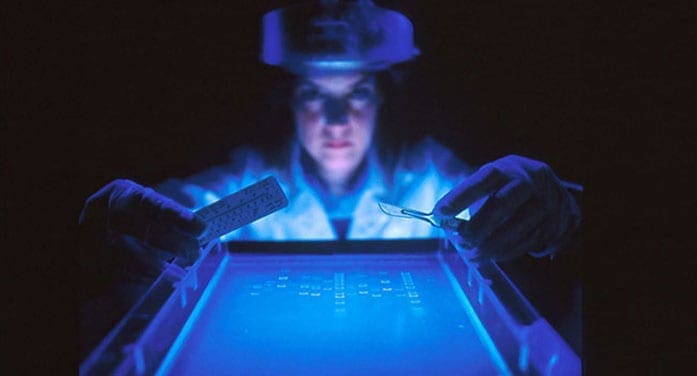Seven new University of Alberta research projects focusing on cancer, pulmonary disease, diabetes and neurology are the latest recipients of funding from the 2020 Kaye Competition.

Soufiane El Hallani
The annual competition supports individuals and collaborative, interdisciplinary and multidisciplinary teams in the pursuit of research, innovation and quality-improvement programs and projects that seek to establish new approaches to patient care. Funding for projects ranges from $25,000 to $250,000.
Six of the projects are led by members of the Faculty of Medicine & Dentistry, including Soufiane El Hallani, assistant professor in the Department of Laboratory Medicine & Pathology, who is developing a new genetic sequencing approach to detecting pancreatic and biliary cancers.
“We’re applying next-generation sequencing to cells taken from lesions in the pancreas or bile ducts, which allows us to detect genomic alterations at the DNA level,” said El Hallani, who is also a member of the Women and Children’s Health Research Institute. “We want to use this genetic information to develop a better tool to provide accurate and precise diagnoses of pancreatic or biliary cancers.”
El Hallani said it can be difficult to conclusively determine whether cells taken from pancreatic or bile duct lesions are benign, normal or malignant just by examining them under a microscope, as is done currently. That uncertainty often leads to a diagnosis of “atypia of undetermined significance,” meaning something is abnormal but there isn’t enough information to say for certain that the cells are cancerous. This can lead to patients not receiving treatment for cancer fast enough or undergoing unnecessary surgeries, Soufiane said.
“We need a better tool to diagnose those lesions; the microscope is not enough. This is where genetic information comes into play,” he said. “Genetic information is more specific and highly reliable. If we find mutations in genes that we are targeting with genetic sequencing, we can use it as a checkpoint to ensure that we have an accurate diagnosis before engaging the patient for surgery.”
Genetic sequencing has come a long way in just a few short years, El Hallani said. Ten years ago, sequencing just one part of the genome could take years and hundreds of thousands of dollars. Today, the entire human genome can be sequenced in 48 hours for less than $1,000. The technology is now becoming ubiquitous in laboratories across Canada, including at the U of A.
Thanks to the funding from the Kaye Competition, El Hallani’s next step is to start recruiting patients to participate in his research project, then collect cells from pancreatic and biliary lesions, sequence them and compare them with the patients’ diagnoses. The team plans on releasing their results to the endoscopic and oncology community to help develop a tool based on the correlation between molecular testing and the risk of malignancy.
“We’re very grateful for the support from the Kaye Competition for this project,” El Hallani said. “Without it, this would just be a dream, a hope, an aspiration.
“Sometimes we can feel frustrated because we see a solution that we can bring forward to improve the care of patients, but we don’t have the resources to do it,” he added. “Support from organizations like the University Hospital Foundation, Kaye Edmonton Clinic and University of Alberta Hospital, through the Kaye Competition, are very welcome. They make our future operations in molecular pathology labs viable.”
The Kaye Competition is a partnership between the University of Alberta Hospital, Kaye Edmonton Clinic and the University Hospital Foundation and was created as a result of a $30-million donation to the UHF from Donald Kaye in 2012, one of the largest donations in the history of Canadian healthcare philanthropy.
2020 Kaye Competition winners
Oleksa Rewa, Faculty of Medicine & Dentistry
Midodrine for the early liberation from vasopressor support in the ICU – LIBERATE
Jennifer Ringrose, Faculty of Medicine & Dentistry
Using home BP monitoring as an alternative to ambulatory monitoring to diagnose hypertension
Soufiane El Hallani, Faculty of Medicine & Dentistry
Evaluation and preoperative integration of next-generation sequencing in the assessment of pancreaticobiliary cytology specimens for cancer detection and precision diagnostics
Joseph LaBossiere, Faculty of Medicine & Dentistry
Prophylactic antibiotics during treatment of neurogenic overactive bladder with intradetrusor onabotulinumtoxinA for the reduction of postoperative UTI
Manisha Gupta, Faculty of Engineering
Biosensor development for monitoring and preventing diabetic foot wounds
Alim Hirji, Faculty of Medicine & Dentistry
Telemonitoring to reduce adverse events for patients on high flow oxygen at the University of Alberta Hospital
Wendy Johnston, Faculty of Medicine & Dentistry
ALS-ID: developing a roadmap for early diagnosis and rapid referral of probable ALS cases to the multidisciplinary ALS clinic at the Kaye Edmonton Clinic
| By Ryan O’Byrne
Ryan is a reporter with the University of Alberta’s Folio online magazine. The University of Alberta is a Troy Media Editorial Content Provider Partner.
The opinions expressed by our columnists and contributors are theirs alone and do not inherently or expressly reflect the views of our publication.
© Troy Media
Troy Media is an editorial content provider to media outlets and its own hosted community news outlets across Canada.


